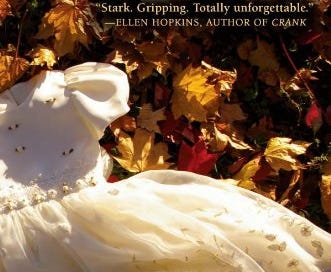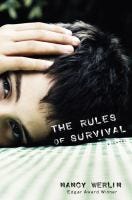Living Dead Girl: On My Book Talk List
“Living Dead Girl” 14th book banned in Utah public schools; plus book ban news
Living Dead Girl
While I normally save all the book challenge and ban news for a Part 2 each week, I want to bring forward this one news item. When I read it, I thought, “I know that book” because I had read it and book talked it to classes. It’s been a minute, so, as I often do, I went back to my School Library Lady blog to see if I’d written anything about it in the past.
Here’s a link to the article that caught my attention:
Utah just banned a 14th book from public schools. Here’s what it’s about. From the Salt Lake Tribune
This time it’s “Living Dead Girl,” by Elizabeth Scott, which follows the story of Alice who — after being kidnapped as a child — endures years of abuse and manipulation while struggling to find hope and a way to escape.
Here’s a clip of the author, Elizabeth Scott, in 2008, defending Living Dead Girl as a book for teens.
Young Adult Novelist Elizabeth Scott Discusses Her Latest Book, Living Dead Girl
My Take
Here’s what I wrote in 2012 when I first read it to see if I wanted recommend it to teens during book talks. This is an honest look before any thought of its being banned or of any of today’s politics of censorship.
Deeply disturbing, Living Dead Girl was a novel I couldn’t put down. It’s a quick read—under two hours, but the impact lasts (and maybe the bad dreams do, too).
Alice is a girl who was abducted at age ten while on a class field trip to an aquarium. She is now fifteen, still living with her abductor, and looking back over events of their five years together. Although there is no explicit description, Alice is clearly sexually abused on a regular basis. Her abductor, Ray, likes little girls, and attempts to keep her very young looking through waxing and limited food intake as well as drugs that hold off puberty.
However, Alice is growing and Ray is tired of her. He tells Alice he wants her help inducting a new little girl into his warped world, where the child will be beaten into mind control (brain washing) and forced to obey Ray’s every command, just as Alice was. Alice hopes that having another girl will give her a break from the constant abuse. But she then realizes that Ray intends to kill her and dispose of her body once the new girl is captured.
From what I’ve read of real abductions, such as that of Elizabeth Smart, the details of this novel ring true. One of the most difficult parts of the book is how no one in Alice’s world recognizes that she is being held hostage. They believe that Ray is her father and home teaching her although he goes to work and locks her in the house. She is unkempt, even dirty. She is too young to have all that waxing without parental permission, but the salon owner never asks for it and doesn’t wonder why she is there.
The thought that we don’t really see things that happen around us (as is true in the last book I reviewed, The Rules of Survival) is as disturbing as the horrific situation of these kids. Maybe reading these novels will help us to be more aware.
It struck me that things that have been on my mind this week converged in that 2012 review.
I mention above that Living Dead Girl reminded me of the real life Elizabeth Smart. In 2002, Smart, age 14, was abducted from her bedroom at knifepoint by a ‘lone wolf’ fundamentalist Mormon, who told her she was his plural wife. He raped her daily for the nine months she was held captive. During those nine months, there were a few times when people saw her and suspected she was the kidnapped girl. But when they asked her if she was okay, being afraid of her captor and his capacity for violence (he’d told her he’d kill her whole family), she said yes.
This week, I created a ‘recommended reading list’ of books on Christian patriarchal cults and included Under the Banner of Heaven by Jon Krakauer. In Banner, Krakauer discusses Elizabeth Smart while bringing home an important point: a teen girl who believes she has no authority over herself is left open to danger from malevolent adults. (I’ll be posting the annotated reading list as the publication of my novel Keep Sweet approaches.)
I also mentioned above having just read The Rules of Survival. A question I asked in the 2012 review of Rules: ‘What if you had a mother so unhinged that she would accuse an innocent person of abusing her kids?’ I happened to be thinking about that this week because Susan Smith, who drowned her two sons by driving her car into a lake in 1994, was just denied parole. Immediately following the murders, she told law enforcement she had been carjacked by a Black man.
The Nighttime Brain
I awoke in the middle of the night last night thinking about the opening chapter of Living Dead Girl, which came back to me. About how clever the predator was at getting Alice to believe he was an employee of the aquarium and that he was directing her back to her classmates rather than into a life of abuse. I felt sorrow over the vast width and depth of children’s vulnerability.
There, too, in the middle of the night, I remembered an incident that took place years ago. I was in Carlsbad, CA to run the San Diego Marathon. My aunt was in CA, visiting from Pennsylvania. She and my parents came to the marathon to cheer me on. Since we were close by, my husband, kids, and I went to Legoland the following day. My mom came, too.
We were in the middle of our theme park outing, deciding on what to do next, when I saw a small boy, about 4-5 years old, wailing. People were passing him in all directions. I went to him, knelt on one knee, and asked if he was lost. He was. Through his tears, he told me that he would never see his parents again because they had been separated. His misunderstanding of his situation surprised me. He was wildly distraught over the ‘forever’ loss of his family.
I told him that his parents were looking for him right then, at that moment. And that Legoland has a place where lost children meet up with lost parents. So all we needed to do was to find an employee to direct us to that spot and then wait for his parents to show up if they weren’t already there. He stopped crying and trusted me completely.
I told my mom I would take the boy to the park employees. She was hesitant. What if someone thought I was kidnapping the child? Maybe I’d be arrested. “If I leave him, someone could kidnap him,” I said. Now, to be fair, my mom was at the beginning of her long dementia journey. But I, too, had thought of this scenario. As I walked away with the boy, I hoped his mom wouldn’t come running up and punch me in the face. Fortunately, I was able to hand him off safely.
The incident only lasted fifteen minutes or so. I know it popped into my insomnia-addled brain both because of how distraught and how trusting that boy was. Granted, I was the type of person children are told to go to when lost—a mom with kids. But I think he would have believed anyone who bothered to stop and console him. Because he was so small and so vulnerable.
We need to stop worrying about teen books like Living Dead Girl that have no history of hurting anyone but only show that evil exists. Instead, we need to work harder against the things that do harm kids. When I see predators being nominated for top government positions, it reminds me that we don't do a great job at that.
Part 2: Library and book challenge/ban news
I’ve mentioned the Utah statewide book bans in past posts, but FYI refresher: these are the other 13 banned titles:
“Blankets” by Craig Thompson.
“A Court of Frost and Starlight” by Sarah J. Maas.
“A Court of Mist and Fury” by Sarah J. Maas.
“A Court of Silver Flames” by Sarah J. Maas.
“A Court of Thorns and Roses” by Sarah J. Maas.
“A Court of Wings and Ruin” by Sarah J. Maas.
“Empire of Storms” by Sarah J. Maas.
“Fallout” by Ellen Hopkins.
“Forever” by Judy Blume.
“Milk and Honey” by Rupi Kaur.
“Oryx & Crake” by Margaret Atwood.
“Tilt” by Ellen Hopkins.
“What Girls Are Made Of” by Elana K. Arnold.
When I first saw this list, I decided to read a Sarah J. Maas novel, A Court of Thorns and Roses, to find out why her work took up almost half of the list. I discussed Thorns in this post.
Corpus Christi Libraries Don’t Know What to Do With Teenagers from Book Riot
The newest developments are that they are considering a new “parent/guardian must be present” library card, which would block these minors from accessing self-checkouts and would require them to check out books only while their parent is present, who must show their ID. The updates to equipment would cost about $10,000.
You might be wondering, what’s the point of this card? Couldn’t these parents just not allow their minor to get a library card (they already require parental permission) and then check out those books on their card, since they have to be present anyway? That would also save them the step of having to show their ID, and it would allow them to use the self-checkout. But no, let’s spend thousands of dollars just to have the option of a useless library card. The biggest problem today is that the youth are borrowing too many of the wrong kinds of books.
It's famous and among the most-removed books in Florida school districts. What is it? From the Tallahassee Democrat
Acclaimed classic “The Handmaid’s Tale” is one of the most-removed books in Florida schools.
New lists from a nonprofit advocacy group and the Florida Department of Education both place that book in the top three of removed novels for the 2023-24 school year, highlighting the school-shelf access effects of recent laws passed by Gov. Ron DeSantis and Florida’s legislative GOP supermajority.
In reversal, Escambia School Board members must testify in book removal case, judge says from the Pensacola News Journal
I’ve been following this story because of the Escambia County defense that book censorship is government speech and therefore cannot impinge on First Amendment rights.
If you’ve missed the First Amendment argument in Florida, here's a recent Article in Publishers Weekly:
Florida Moves to Dismiss Publisher Lawsuit Over Book Bans
More substantially, Florida state attorneys argue that the plaintiffs lack standing to bring the suit for several reasons, including a common—and thus far unsuccessful—claim in multiple book-banning lawsuits in recent years: that because libraries are public institutions, decisions about which books can go on library shelves are "government speech" and thus not subject to First Amendment scrutiny.
Generally, I stick to the US, but I thought you might be interested in what goes on in a theocracy. Here’s Afghanistan.
Taliban’s War on Books: Seizing Anything That Conflicts with Their Ideology from 8AM Media
As to ideology:
Texas Public School Students Could Soon be Tested on the Bible From LitHub






"A teen girl who believes she has no authority over herself is left open to danger from malevolent adults." This is SO exactly right.
Great article. I HATE book banning.